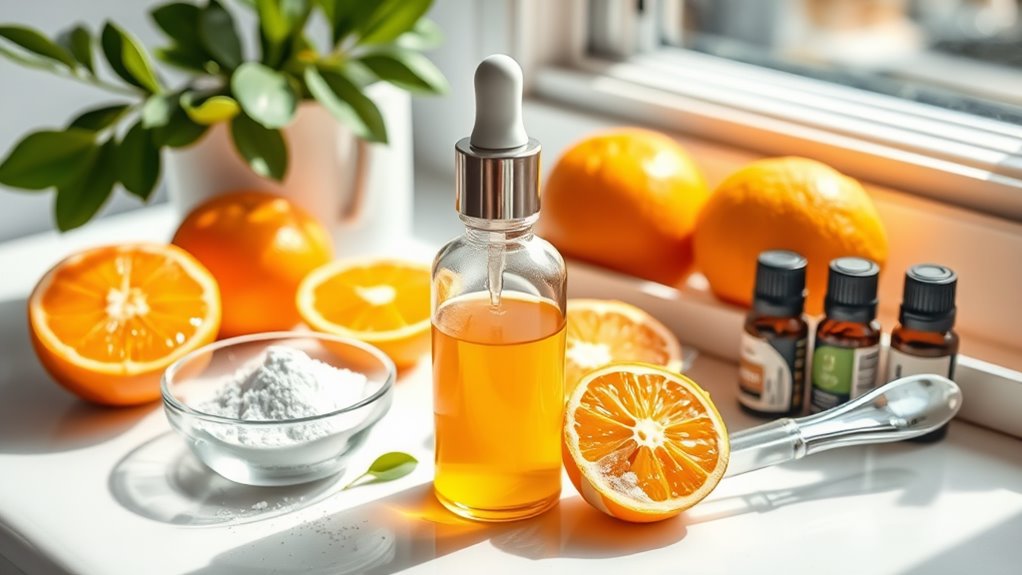Vitamin C Hacks for Glowy, Spot-Free Skin
For glowy, spot-free skin, vitamin C is your best friend. It brightens your complexion, fights dark spots, and boosts collagen for elasticity. Choose a product with 10%-20% concentration and apply it in the morning on dry skin for maximum absorption. Pair it with Vitamin E or hyaluronic acid for added benefits. Remember to use sunscreen afterward. Avoid common mistakes like applying on wet skin or mixing with strong acids. There’s much more to discover about harnessing vitamin C’s full potential!
Key Takeaways
- Use a Vitamin C serum with 10% to 20% concentration for optimal brightening and skin tone improvement.
- Apply Vitamin C in the morning on dry skin before moisturizing to enhance absorption and effectiveness.
- Combine Vitamin C with Hyaluronic Acid for added moisture and a plump, radiant complexion.
- Layer Vitamin C with Vitamin E and Ferulic Acid for enhanced protection against environmental damage.
- Avoid applying Vitamin C on wet skin and ensure products are fresh to maximize benefits and prevent degradation.
The Benefits of Vitamin C for Your Skin
Vitamin C is a powerhouse for your skin, offering a range of benefits that can transform your complexion. This potent antioxidant brightens your skin tone, reducing the appearance of dark spots and hyperpigmentation.
When you incorporate vitamin C into your routine, you boost collagen production, which helps maintain skin elasticity and firmness. You’ll also notice a decrease in fine lines and wrinkles, giving your skin a youthful glow.
Additionally, vitamin C protects against environmental damage from UV rays and pollution, acting as a shield for your skin. By enhancing overall skin texture and radiance, vitamin C skin products are essential in achieving that coveted, luminous look. Furthermore, natural remedies incorporating vitamin C can complement your skincare routine for even more effective results.
Elevate your skincare game by harnessing these powerful benefits today.
Choosing the Right Vitamin C Product
When choosing the right Vitamin C product, you need to contemplate the type of Vitamin C it contains, as each form has different benefits.
Pay attention to the concentration, since higher potency can yield better results, but it mightn’t be suitable for all skin types.
Finally, think about the formulation; factors like stability and additional ingredients can impact how effective the product is for your skin.
Types of Vitamin C
Choosing the right vitamin C product can feel overwhelming with so many options available. To simplify your decision, familiarize yourself with the main types: ascorbic acid, sodium ascorbyl phosphate, and magnesium ascorbyl phosphate.
Ascorbic acid is the gold standard, offering potent antioxidant benefits, but it may irritate sensitive skin. Sodium ascorbyl phosphate is a gentler option, converting to ascorbic acid upon application, making it suitable for most skin types. Magnesium ascorbyl phosphate is another mild alternative, known for its moisturizing properties.
Each type has unique advantages, so consider your skin’s needs and sensitivities. By understanding these distinctions, you’ll be better equipped to select a vitamin C product that enhances your skin’s radiance and health.
Concentration Matters
Understanding the types of vitamin C is just the beginning; the concentration of the product also plays a significant role in its effectiveness.
When choosing a vitamin C serum, aim for concentrations between 10% to 20%. Lower concentrations can be beneficial for sensitive skin, offering gentle antioxidant protection without irritation.
Conversely, higher concentrations provide more potent results, tackling stubborn dark spots and boosting collagen production. However, don’t rush into high-potency products without evaluating your skin’s tolerance.
Start at a lower concentration and gradually increase as your skin adapts. This approach not only maximizes benefits but minimizes potential side effects.
Formulation Considerations
While the concentration of vitamin C is essential, the formulation itself can make or break your skincare routine.
Look for stable forms like L-ascorbic acid, known for its potency. Pair it with synergistic ingredients like vitamin E or ferulic acid to enhance efficacy and stability.
Consider the pH level; a lower pH is often more effective but can irritate sensitive skin. If you prefer a gentler approach, try derivatives like ascorbyl glucoside or sodium ascorbyl phosphate.
Packaging matters too; opt for opaque, airtight containers to prevent oxidation.
Finally, be mindful of your skin type; oily skin may benefit from lightweight serums, while drier skin may prefer creamy formulations.
Choose wisely to reveal your skin’s full radiant potential.
Best Ways to Apply Vitamin C
How can you get the most out of your Vitamin C for glowing skin? First, apply it in the morning after cleansing and before moisturizing. This allows the antioxidant properties to protect your skin from daily environmental stressors.
Use a few drops of a serum with at least 10% concentration—this boosts absorption and effectiveness. Gently pat it onto your skin rather than rubbing to minimize irritation. If you’re using a Vitamin C cream, make sure to apply it evenly across your face and neck.
Always follow up with sunscreen; Vitamin C enhances your sun protection. Stick with it consistently for best results, and you’ll notice a brighter, more even complexion over time. Master this routine, and watch your skin transform!
Combining Vitamin C With Other Ingredients
To maximize the benefits of Vitamin C for your skin, consider combining it with other powerful ingredients. This synergy can enhance absorption and effectiveness, leading to glowy, spot-free skin. Here’s a quick guide to some ideal pairings:
| Ingredient | Benefit |
|---|---|
| Vitamin E | Boosts hydration and protects against UV damage. |
| Hyaluronic Acid | Increases moisture retention for plump skin. |
| Ferulic Acid | Stabilizes Vitamin C and enhances its antioxidant effects. |
| Niacinamide | Reduces redness and improves skin texture. |
Incorporating natural oils into your skincare routine can further support the rejuvenating effects of Vitamin C.
DIY Vitamin C Remedies for Glowing Skin
If you want glowing skin, homemade Vitamin C remedies are a game changer.
You can easily whip up a Vitamin C serum or create vibrant face masks using simple ingredients.
Let’s explore how these DIY recipes can boost your skin’s radiance!
Homemade Vitamin C Serum
Creating your own homemade Vitamin C serum can be a game-changer for achieving glowing skin. With just a few simple ingredients, you can harness the power of Vitamin C to brighten your complexion and combat signs of aging. Here’s a quick guide to get you started:
| Ingredient | Purpose |
|---|---|
| Vitamin C Powder | Brightens skin, reduces dark spots |
| Distilled Water | Hydrates and activates serum |
| Aloe Vera Gel | Soothes and nourishes skin |
| Essential Oil | Adds fragrance and boosts benefits |
Combine one teaspoon of Vitamin C powder with two teaspoons of distilled water and one teaspoon of aloe vera gel. Add a few drops of your favorite essential oil for a revitalizing scent. Store in a dark bottle to preserve potency!
Vitamin C Face Masks
When you want to boost your skin’s radiance, DIY Vitamin C face masks offer a delightful and effective solution. You can easily craft your own mask using ingredients like fresh oranges or lemons, known for their high vitamin C content.
Simply blend the fruit with honey for hydration and yogurt for added exfoliation. Apply the mixture to your face and let it sit for about 15 minutes before rinsing. This not only brightens your complexion but also evens out skin tone and reduces dark spots.
For a revitalizing twist, consider adding turmeric for its anti-inflammatory properties. Regular use of these masks can enhance your skin’s luminosity, giving you that coveted glow.
Embrace these simple remedies for radiant, spot-free skin!
Tips for Storing Vitamin C Products
While you’ve invested in high-quality vitamin C products for your skin, proper storage is crucial to maintain their potency and effectiveness.
First, keep your vitamin C products in a cool, dark place, away from direct sunlight and heat sources. A bathroom cabinet or drawer works well.
Always verify the container is tightly sealed; air exposure can degrade the formula. If possible, choose products in opaque or dark-colored packaging to further shield them from light.
For serums, consider refrigerating them to prolong their shelf life.
Finally, check expiration dates regularly and discard any products that have changed color or consistency.
Common Mistakes to Avoid With Vitamin C
Many people unknowingly sabotage the benefits of vitamin C by making common mistakes in their skincare routine. One major error is applying it over damp skin; moisture can dilute its potency. Make certain your skin is dry before application for maximum absorption.
Another mistake is using vitamin C alongside certain acids or retinoids, which can destabilize its effectiveness. Instead, layer them at different times of the day.
Also, don’t forget to check the product’s expiration date—oxidized vitamin C loses its efficacy. Finally, avoid using too much; a few drops are sufficient. Additionally, ensure you are practicing proper cleansing techniques to prevent any residues that could hinder vitamin C absorption.
Mastering these simple practices will allow you to harness the full power of vitamin C, leading to that coveted glowy, spot-free skin you desire.
Frequently Asked Questions
Can I Use Vitamin C on Sensitive Skin?
Yes, you can use vitamin C on sensitive skin, but start with a lower concentration. Patch test first to gauge your skin’s reaction. Gradually increase usage as your skin adapts to avoid irritation.
How Long Does It Take to See Results From Vitamin C?
You’ll typically notice results from vitamin C within 2 to 4 weeks, depending on your skin type and the product’s concentration. Consistency in application will enhance its effectiveness, so stick with it for best results.
Is It Safe to Use Vitamin C During Pregnancy?
You can safely use vitamin C during pregnancy, but it’s wise to consult your healthcare provider first. They’ll guide you on the best products and concentrations to guarantee both your safety and your baby’s health.
Can I Mix Vitamin C With My Sunscreen?
Yes, you can mix vitamin C with your sunscreen. It enhances protection against UV rays and improves skin health. Just verify your products are compatible to maximize their benefits without compromising effectiveness or causing irritation.
What Are the Signs of Vitamin C Product Expiration?
You’ll notice changes in color, consistency, or smell when your vitamin C product expires. If it darkens or develops a strange odor, it’s time to replace it; expired products won’t deliver the benefits you need.





